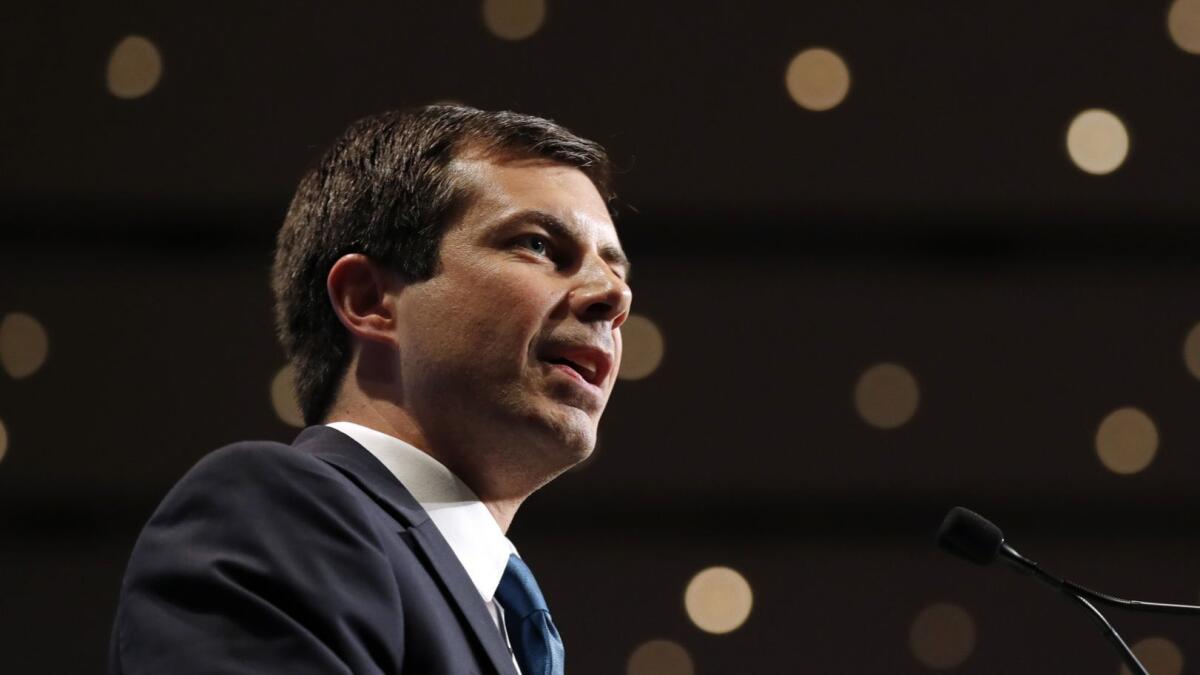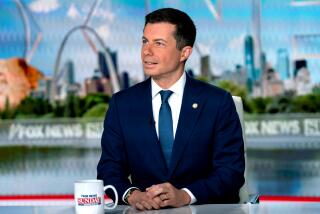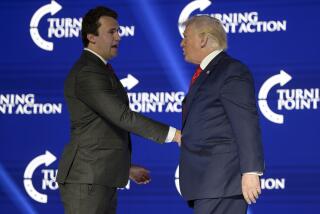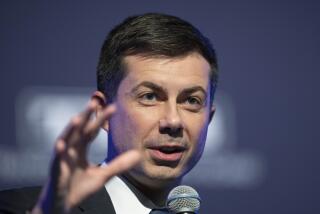A corporation won’t let Pete Buttigieg talk about three years of his life

- Share via
By presidential campaign standards, Pete Buttigieg has been pretty much an open book — but with one chapter missing.
The Democratic South Bend, Ind., mayor has let reporters sit on his campaign bus and pelt him with questions until they get tired; he’s spoken at length about his personal experience coming out as a gay man; he’s shown a willingness to face some of his most withering critics.
But Buttigieg won’t talk about his three years of work for McKinsey & Co., the famous — and lately, controversial — management consulting firm.
Almost a decade after leaving McKinsey in 2010, Buttigieg is still bound by a nondisclosure agreement that his campaign says McKinsey is refusing to lift, leaving a large hole in the 37-year-old’s otherwise closely examined life story.
“We have asked McKinsey to be released from the NDA in full, and we have asked McKinsey if we can release a list of clients,” campaign spokesman Sean Savett said. “To date, they have not agreed. We will continue to ask and are eager to share more about his work as soon as we are able.”
Buttigieg told NBC News on Thursday: “Look, I keep my word and I signed a legal document. When you serve a client … you’re going to respect their confidentiality. But I do think it would be a good thing for that to be released.”
Buttigieg’s legal vow of secrecy — coupled with McKinsey’s silence when asked for comment — is an increasingly common collision of the growing use of nondisclosure agreements in the private sector with the public’s expectation of transparency from candidates seeking higher office.
“We’re seeing it become an issue, and it’s likely going to become more of an issue over time,” said Robert Weissman, president of Public Citizen, a liberal advocacy group that pushes to limit corporate influence in politics. “Buttigieg’s professional career doesn’t go back that far, and this is an important part of it, and absolutely American people have a right to know what he was doing and what was going on if he’s going to be a serious contender for the presidency.”
In 2012, Republican presidential nominee Mitt Romney was bound by a confidentiality agreement from disclosing the underlying investors of Bain Capital, the private equity firm he founded that was notorious for cutting costs.
Bain’s work has come up again in this election after fellow Bain alumnus and former Massachusetts Gov. Deval Patrick announced his entry into the Democratic race. His campaign did not respond to inquiries about whether he had signed a similar agreement.
The most notorious use of a confidentiality agreement came in the closing days of the 2016 presidential election. Then-candidate Donald Trump allegedly directed his personal attorney, Michael Cohen, to pay off porn performer Stormy Daniels in return for a nondisclosure agreement over her allegations of an affair with Trump in 2006.
The payoff was later deemed an illegal unreported campaign contribution.
In Buttigieg’s case, corporate secrecy is likely to win out, legal experts say.
“There is a legitimate business motive for enforcing an NDA here,” said Wilson Huhn, a professor of law at Duquesne University who has been critical of these secret contracts. “But yeah, when the person’s running for president, I would certainly stand with the journalists and with the citizenry and say we really have to have all of the relevant information about somebody.”
Nondisclosure agreements have come under growing criticism in recent years for their use in concealing sexual-abuse settlements. But imposing them to conceal proprietary information from competitors, as McKinsey does, has largely avoided criticism.
A politician running for president who cannot speak about three years of his life is an exception.
“That’s the problem with nondisclosure agreements,” said Mark Fenster, a University of Florida law professor. “When they become overly broad, their very existence becomes a problem.”
Companies often use consultant firms such as McKinsey to help find inefficiencies and cut costs, which can bring profits for shareholders while raining woe on employees.
“One of the cardinal virtues within McKinsey is confidentiality,” a former McKinsey associate, Ethan M. Rasiel, wrote in a 1999 book called “The McKinsey Way.” “The Firm guards its secrets closely. I, along with every other former McKinsey-ite, agreed never to disclose confidential information about the Firm and its clients, even after leaving McKinsey.” Clients are also reportedly bound by these agreements.
Buttigieg was hired at the firm’s Chicago office in 2007, fresh off his Rhodes Scholarship at Oxford.
In his memoir, Buttigieg hints at projects that included studying prices for a Canadian grocer, “energy efficiency research” and “war-zone economic development work to help grow private sector employment in Iraq and Afghanistan.”
McKinsey has recently faced criticism for advising opioid manufacturers how to boost sales and working with authoritarian governments in China, Saudi Arabia and Turkey.
This week, the New York Times and ProPublica reported that McKinsey consultants working with Immigration and Customs Enforcement proposed “detention savings opportunities,” including cuts in food and medical care for detainees, that made ICE officials uncomfortable.
That led four immigration activist groups on Thursday to demand Buttigieg “immediately return” his donations from McKinsey employees, who contribute to the two-term mayor’s campaign more than any other Democratic presidential candidate.
Buttigieg’s campaign declined to return the money but said it had taken steps to prevent future donations from McKinsey consultants who were specifically involved in the ICE project.
“We have combed through thousands of pages of documents that ProPublica obtained to ensure that we had never accepted a donation from any McKinsey employee who was named as being involved in this project, and if any were to donate to Pete, we would immediately return their donation,” a spokesman said.
A presidential rival, Sen. Elizabeth Warren of Massachusetts, challenged Buttigieg on Thursday night to release the names of his McKinsey clients, telling reporters, “I think voters want to know about possible conflicts of interest.”
Buttigieg has repeatedly been critical when asked about McKinsey’s controversial portfolio.
“As somebody who left the firm a decade ago, seeing what certain people in that firm have decided to do is extremely frustrating and extremely disappointing,” Buttigieg said Wednesday.
While legal experts didn’t doubt the legality of the confidentiality agreement, they questioned privatization of information that could be of use to the public.
“We can’t just blithely give up on the public’s right to know information by thinking, ‘Well, there’s a contract, there’s a nondisclosure agreement, that’s all we need to know, we can’t get the information,’” said Alan Garfield, a professor who studies nondisclosure agreements at Widener University Delaware Law School.
Buttigieg could choose to break the agreement, but then he would risk facing expensive lawsuits from McKinsey or its clients.
“For McKinsey, maybe their mystique in being able to hold a major candidate for president under silence adds to the mystery and the weird power they seem to hold in certain segments of the international and American public,” said Fenster, a specialist in contract law and issues of transparency.
But what might be good for McKinsey’s image in the business world might not be good for McKinsey’s image with the broader public.
“It would look really bad for McKinsey, I think, to try to enforce this against Mayor Pete if he discloses information in a reasonable and ethical way,” Fenster said.
More to Read
Get the L.A. Times Politics newsletter
Deeply reported insights into legislation, politics and policy from Sacramento, Washington and beyond. In your inbox twice per week.
You may occasionally receive promotional content from the Los Angeles Times.











